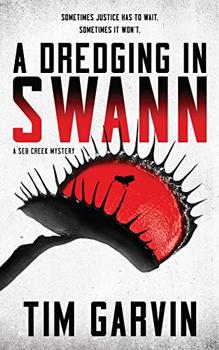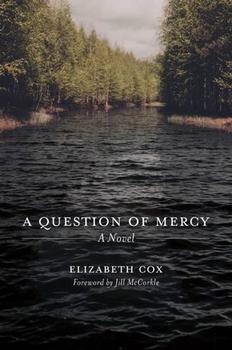Summary | Excerpt | Reviews | Beyond the book | Read-Alikes | Genres & Themes | Author Bio

The Seb Creek Mysteries #1
by Tim GarvinA Dredging in Swann, set in fictional Swann County, North Carolina, centers around fresh-out-of-the-box Sheriff's Detective Seb Creek, a former Marine MP afflicted with post-traumatic stress disorder resulting from time served overseas.
At the commencement of the novel, Seb is tasked with investigating the suspicious death of Leo Sackler, an elderly Black man in his seventies who was recently released from prison after 48 years served for the brutal axe-murder of a wealthy local white man.
Elsewhere in Swann County, another veteran, Cody Cooper, engages in the federal crime of poaching Venus flytraps. While out poaching one evening, he witnesses a tragic accident involving two military helicopters that crash into each other while returning to base. He stumbles upon three Stinger missiles, dropped from one of the helicopters immediately prior to the accident. Seeing an opportunity, though maybe not considering the ramifications of his decision, he spirits the ordnance to a hiding place. Finding himself embroiled in an FBI investigation to locate the missing missiles, Cody enlists the assistance of local crime maven Elton Gleen to support him in his attempts to capitalize on his discovery.
Garvin's novel is an assured crime story that ticks the right genre boxes without ever feeling manufactured. Swamp noir vibes blend with the standard detective novel or whodunnit, as the parallel investigations involving Seb Creek and the FBI become inextricably entangled. The novel is fun, fluid and packed full of smart dialogue. It is meticulously plotted and well researched from an investigative, military and psychological perspective. Garvin also makes exemplary use of key characters to elaborate thematic concerns. In particular, he scrutinizes issues of combat trauma and the post-traumatic aftermath of high-stress experiences.
The novel finds time to consider the evolution of race relations in the region, too. Differences can be seen between the disingenuous historical conviction of Leo Sackler for murder with more progressive attitudes reflective of contemporary North Carolina. These attitudes are best summed up by the Pass the Salt singers, Seb Creek's singing group, which is an inclusive and multicultural ensemble made up of survivors of PTSD. While members of the group occasionally define themselves and their musical taste in terms of race, the group is a collaborative and integrated community in which difference is celebrated. This is obvious when Seb approaches hip-hop enthusiast Ahmad to collaborate with him on a composition:
Seb recited, "I used to be afraid of love, I hid my fear in pride."
"That's definitely white."
"I happen to be white."
"We might could black it up."
"We could."
While the novel doesn't elaborate on race as much as the traumatizing psychological aftershocks experienced by combat veterans, it is central to the story's narrative. Prejudicial attitudes cast a long shadow, serving to facilitate and shape events.
The depiction of key characters, particularly the nuanced and empathetic view of Seb and Cody's shared experience of PTSD, is one of the book's fundamental strengths. Seb is a well-adjusted, compassionate member of society, who is managing his PTSD in a manner conducive to recovery. A history of police brutality accusations and difficulty establishing romantic relationships indicate he isn't fully recovered from past experiences. However, we have the initial impression that he is able to channel these experiences into work and extracurricular therapeutic activities. Cody represents Seb's opposite. His experience of PTSD has rendered him isolative and dysfunctional. Re-integrating into civilian life has proven difficult. He loiters on society's fringes, vulnerable to predators, who befriend and exploit him at every opportunity.
An endearing ensemble of supporting characters adds enjoyment to proceedings. There's a humorous coroner, who is skilled in the art of crime-scene banter. There's Elton Gleen, whose activities include drug-trafficking and renting hot-tubs out to discerning bathers. Then there's charismatic hog-farmer Rufus "Squint" Cooper, Cody's estranged dad, who doesn't seem to care what happens to his livestock.
For fans of the detective novel looking for an original approach to the genre, A Dredging in Swann has a lot to recommend it. As a straight-up mystery, it is enjoyably puzzling. As an enthralling and courageous meditation on the psychological ravages of PTSD and the troubling history of race relations in the region, it is both optimistic and illuminating. One hopes this isn't the last we have seen of Seb Creek and Swann County and that further mysteries are planned in the not-too-distant future.
![]() This review was originally published in The BookBrowse Review in February 2020, and has been updated for the
February 2021 edition.
Click here to go to this issue.
This review was originally published in The BookBrowse Review in February 2020, and has been updated for the
February 2021 edition.
Click here to go to this issue.

If you liked A Dredging in Swann, try these:

by Elizabeth Cox
Published 2016
Adam Finney, a young man who is mentally disabled, faces sterilization and lobotomy in a state-supported asylum. When he is found dead in the French Broad River of rural North Carolina, his teenaged stepsister, Jess, is sought for questioning by their family and the police.

by Joe R. Lansdale
Published 2016
Only Hap and Leonard would catch a cold case with hot cars, hot women, and ugly skinheads.
Your guide toexceptional books
BookBrowse seeks out and recommends the best in contemporary fiction and nonfiction—books that not only engage and entertain but also deepen our understanding of ourselves and the world around us.